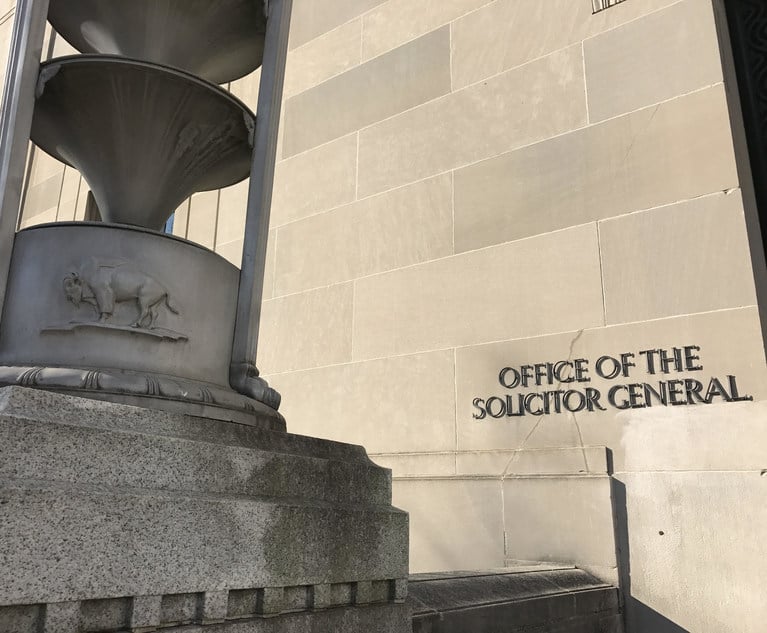 U.S. Supreme Court building in Washington, D.C. Photo: Diego M. Radzinschi/ALM
U.S. Supreme Court building in Washington, D.C. Photo: Diego M. Radzinschi/ALM The Marble Palace Blog: 'Plessy' and Precedent
The scar of "Plessy v. Ferguson" still reverberates in the current Supreme Court.
January 07, 2022 at 11:41 AM
4 minute read
Thank you for reading The Marble Palace Blog, which I hope will inform and surprise you about the Supreme Court of the United States. My name is Tony Mauro. I've covered the Supreme Court since 1979 and for ALM since 2000. I semiretired in 2019, but I am still fascinated by the high court. I'll welcome any tips or suggestions for topics to write about. You can reach me at [email protected].
In the "better-late-than-never" category, Louisiana Gov. John Bel Edwards signed a posthumous pardon for Homer Plessy on Jan. 5 in a ceremony in New Orleans.
It was 1892 when Plessy, a Black man, volunteered to be arrested for refusing to leave a whites-only railroad car, thereby violating Louisiana's "Separate Car Act." He took his case to the U.S. Supreme Court, ending in Plessy v. Ferguson, a "separate but equal" decision in favor of Louisiana that besmirched the high court's reputation for decades.
"The stroke of my pen on this pardon, while momentous, it doesn't erase generations of pain and discrimination. We can all acknowledge we have a long ways to go," Edwards said. "I am beyond grateful that I have a small part to play in ensuring that Homer Plessy's legacy will be entirely defined by the rightness of his cause and undefiled by an unjust criminal conviction."
Plessy's legacy lives on, not only as a symbol fighting segregation, but as someone whose name still redounds at the current Supreme Court. An online search of Supreme Court opinions, journals and argument transcripts found Plessy's name has been cited 34 times since 2000. Most of the citations involve when and whether Supreme Court precedents should be overturned, as Plessy v. Ferguson was in Brown v. Board of Education in 1954.
Steve Luxenberg, author of "Separate," the definitive book about Plessy v. Ferguson, wrote, "The Plessy case underscores a central fact about the Supreme Court: Its decisions cannot be viewed in isolation. They follow a string of earlier rulings, and they precede a fresh set of issues."
As recently as Dec. 1, Plessy's name was invoked by the Supreme Court. When the justices grappled with the abortion case Dobbs v. Jackson Women's Health Organization, several justices pointed to the Plessy decision as one that was "egregious" enough to be overturned. Overturning precedents such as Roe v. Wade and Planned Parenthood v. Casey are at stake in the case.
Here are some of the Supreme Court mentions of Plessy since 2000:
➤ "A lot of the colloquy you've had with all of us has been about the benefits of stare decisis, which I don't think anyone disputes, and, of course, no one can dispute because it's part of our stare decisis doctrine that it's not an inexorable command and that there are some circumstances in which overruling is possible. You know, we have Plessy, Brown. We have Bowers v. Hardwick to Lawrence [v. Texas]." — Justice Amy Coney Barrett during the Dobbs oral argument in December 2021.
➤ "My view of the Constitution is Justice [John Marshall] Harlan's [dissenting] view in Plessy: 'Our Constitution is color-blind, and neither knows nor tolerates classes among citizens.'" Concurrence by Justice Clarence Thomas in the 2007 case Parents Involved in Community Schools v. Seattle School District No. 1.
➤ "Stare decisis has many virtues, but when it comes to enforcing the Constitution, this court must take (and always has taken) special care in the doctrine's application. … Indeed, blind obedience to stare decisis would leave this court still abiding grotesque errors like Dred Scott v. Sandford, Plessy v. Ferguson and Korematsu v. United States." Justice Neil Gorsuch in dissent in the 2019 case Gamble v. United States.
➤ "Perhaps the court is hesitant to take up this issue at all because it would require fiddling with a 70-year-old precedent that is demonstrably wrong. But if the Feres doctrine is so wrong that we cannot figure out how to rein it in, then the better answer is to bid it farewell. There is precedent for that approach [including Brown v. Board of Education overruling Plessy v. Ferguson]." Justice Clarence Thomas dissenting in denying certiorari in the 2021 case Jane Doe v. United States.
➤ "Stare decisis is neither an 'inexorable command,' nor 'a mechanical formula of adherence to the latest decision.' If it were, segregation would be legal [see Plessy v. Ferguson], minimum wage laws would be unconstitutional, and the government could wiretap ordinary criminal suspects without first obtaining warrants." Chief Justice John Roberts Jr. concurring in the 2010 case Citizens United v. Federal Election Commission.
NOT FOR REPRINT
© 2025 ALM Global, LLC, All Rights Reserved. Request academic re-use from www.copyright.com. All other uses, submit a request to [email protected]. For more information visit Asset & Logo Licensing.
You Might Like
View All
Trump's DOJ Withdraws Opposition to Law Banning Trans Care for Minors

Supreme Court Denies Trump's Request to Pause Pending Environmental Cases

January Petitions Press High Court on Guns, Birth Certificate Sex Classifications

‘Diminishing Returns’: Is the Superstar Supreme Court Lawyer Overvalued?
Trending Stories
- 1How Alzheimer’s and Other Cognitive Diseases Affect Guardianship, POAs and Estate Planning
- 2How Lower Courts Are Interpreting Justices' Decision in 'Muldrow v. City of St. Louis'
- 3Phantom Income/Retained Earnings and the Potential for Inflated Support
- 4Should a Financially Dependent Child Who Rejects One Parent Still Be Emancipated?
- 5Advising Clients on Special Needs Trusts
Who Got The Work
J. Brugh Lower of Gibbons has entered an appearance for industrial equipment supplier Devco Corporation in a pending trademark infringement lawsuit. The suit, accusing the defendant of selling knock-off Graco products, was filed Dec. 18 in New Jersey District Court by Rivkin Radler on behalf of Graco Inc. and Graco Minnesota. The case, assigned to U.S. District Judge Zahid N. Quraishi, is 3:24-cv-11294, Graco Inc. et al v. Devco Corporation.
Who Got The Work
Rebecca Maller-Stein and Kent A. Yalowitz of Arnold & Porter Kaye Scholer have entered their appearances for Hanaco Venture Capital and its executives, Lior Prosor and David Frankel, in a pending securities lawsuit. The action, filed on Dec. 24 in New York Southern District Court by Zell, Aron & Co. on behalf of Goldeneye Advisors, accuses the defendants of negligently and fraudulently managing the plaintiff's $1 million investment. The case, assigned to U.S. District Judge Vernon S. Broderick, is 1:24-cv-09918, Goldeneye Advisors, LLC v. Hanaco Venture Capital, Ltd. et al.
Who Got The Work
Attorneys from A&O Shearman has stepped in as defense counsel for Toronto-Dominion Bank and other defendants in a pending securities class action. The suit, filed Dec. 11 in New York Southern District Court by Bleichmar Fonti & Auld, accuses the defendants of concealing the bank's 'pervasive' deficiencies in regards to its compliance with the Bank Secrecy Act and the quality of its anti-money laundering controls. The case, assigned to U.S. District Judge Arun Subramanian, is 1:24-cv-09445, Gonzalez v. The Toronto-Dominion Bank et al.
Who Got The Work
Crown Castle International, a Pennsylvania company providing shared communications infrastructure, has turned to Luke D. Wolf of Gordon Rees Scully Mansukhani to fend off a pending breach-of-contract lawsuit. The court action, filed Nov. 25 in Michigan Eastern District Court by Hooper Hathaway PC on behalf of The Town Residences LLC, accuses Crown Castle of failing to transfer approximately $30,000 in utility payments from T-Mobile in breach of a roof-top lease and assignment agreement. The case, assigned to U.S. District Judge Susan K. Declercq, is 2:24-cv-13131, The Town Residences LLC v. T-Mobile US, Inc. et al.
Who Got The Work
Wilfred P. Coronato and Daniel M. Schwartz of McCarter & English have stepped in as defense counsel to Electrolux Home Products Inc. in a pending product liability lawsuit. The court action, filed Nov. 26 in New York Eastern District Court by Poulos Lopiccolo PC and Nagel Rice LLP on behalf of David Stern, alleges that the defendant's refrigerators’ drawers and shelving repeatedly break and fall apart within months after purchase. The case, assigned to U.S. District Judge Joan M. Azrack, is 2:24-cv-08204, Stern v. Electrolux Home Products, Inc.
Featured Firms
Law Offices of Gary Martin Hays & Associates, P.C.
(470) 294-1674
Law Offices of Mark E. Salomone
(857) 444-6468
Smith & Hassler
(713) 739-1250








